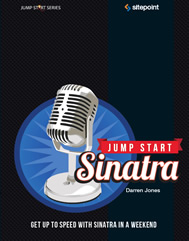Why Do Apple, GitHub and the BBC all use Sinatra?

It’s a new year, and what better way to kick off a year of learning than with the release of the third ebook in our Jump Start Series? In the digital edition of Jump Start Sinatra you can learn how to use Sinatra’s lightning speed and flexibility to make your Ruby projects sing!
Apple, GitHub and the BBC all use Sinatra, and the reason it’s become a natural choice for large companies like these is its ability to build fast and efficient web applications … without necessarily carrying the weight of Rails. The entire Sinatra codebase weighs in at less than 2,000 lines—-around 1% the size of Rails! This means that, as a developer, you get great performance and speed, the flexibility to work the way you want to and also easy to maintain code.
Now, let’s hear from author Darren Jones, as he explains Sinatra and his new book in more detail. Over to you Darren!
“I started using Sinatra about three years ago, but found it quite hard at the time to find decent tutorials that explained how it worked. As I learned Sinatra, I made notes and wrote tutes. At the back of my mind, I wanted to collect all my Sinatra knowledge in one place and explain it from start to finish. Jump Start Sinatra is the result.
The book is small, which is fitting because Sinatra is small though perfectly formed. It is a Ruby DSL (domain-specific language) that is used for building websites, applications, or services. Sinatra allows you to develop applications rapidly with minimal fuss and setup using an expressive syntax that’s simple to follow. It’s fast and stable, without tying your hands with enforced conventions.
Jump Start Sinatra dives straight into using Sinatra in Chapter One with some basic examples, and then goes on to build a modular, database-driven website from start to finish. There are no barriers to entry; all you need is a text editor. Some experience of Ruby would help, but as long as you’re familiar with a bit of programming and HTML, you should be able to advance through it.
In the book, I cover using ERB and Slim to create views, using CSS preprocessors such as Sass, connecting to a database using DataMapper, using Sinatra’s configuration options and helper methods, using CoffeeScript to take the pain out of JavaScript, as well as deploying applications to the Heroku service. It also covers developing your own Sinatra extensions and middleware, as well as making modular applications that can be used as Rack middleware.
What excites me about this book is that it provides everything you need to know to go on and build a fully functioning web application. Sinatra gives you the tools to put your Ruby code onto the Web, then jumps out of the way to let you get on with developing your application your way. Whether you want to build a small and simple website, massive database-driven application, or the next big social media sensation, this book will give you the tools you need to get started.”
Thanks, Darren, for sharing your thoughts.
We look forward to hearing your comments and feedback …
- Have you ever tried Sinatra (or Ruby)?
- What other questions do you have?
Frequently Asked Questions about Sinatra
Why is Sinatra a popular choice among developers?
Sinatra is a popular choice among developers due to its simplicity and flexibility. Unlike other web application frameworks that come with a lot of built-in functionalities, Sinatra is a DSL (Domain Specific Language) for quickly creating web applications in Ruby with minimal effort. It’s lightweight, easy to use, and doesn’t enforce a specific architectural pattern, giving developers the freedom to design their applications as they see fit. This makes it an excellent choice for small to medium-sized web applications, APIs, and microservices.
How does Sinatra compare to other web application frameworks like Rails?
While Rails is a full-featured, opinionated framework that follows the MVC (Model-View-Controller) pattern, Sinatra is a micro-framework that provides only the bare essentials for web development. This makes Sinatra less complex and more flexible than Rails, allowing developers to build applications with less boilerplate code. However, this also means that developers need to make more decisions about how to structure their application and which additional libraries to use.
What are some notable companies or organizations that use Sinatra?
Some notable companies and organizations that use Sinatra include Apple, GitHub, and the BBC. These organizations use Sinatra for a variety of purposes, from building internal tools and services to powering public-facing web applications.
How can I get started with Sinatra?
To get started with Sinatra, you first need to install Ruby and the Sinatra gem. Once you’ve done that, you can create a new Ruby file, require the Sinatra gem, and start defining routes for your application. Each route corresponds to a URL pattern and a block of code that should be executed when that URL is requested.
Can I use Sinatra to build APIs?
Yes, Sinatra is an excellent choice for building APIs. Its simplicity and flexibility make it easy to define routes that correspond to different API endpoints, and its support for different HTTP methods (GET, POST, PUT, DELETE, etc.) allows you to implement a full range of CRUD (Create, Read, Update, Delete) operations.
What kind of support is available for Sinatra?
Sinatra has a vibrant and active community of developers who contribute to its development and provide support to other users. You can find help on the Sinatra mailing list, the #sinatra channel on IRC, and various online forums and Q&A sites.
Can I use Sinatra with a database?
Yes, you can use Sinatra with a database. Sinatra itself doesn’t provide any database functionality, but you can easily integrate it with a database library like ActiveRecord or Sequel.
How does Sinatra handle sessions?
Sinatra provides built-in support for sessions, which allow you to store data across multiple requests from the same user. You can enable sessions by setting the enable :sessions option in your application, and then you can store data in the session using the session hash.
Can I use Sinatra to serve static files?
Yes, you can use Sinatra to serve static files. By default, Sinatra looks for static files in a directory named public in the root of your application. You can change this directory by setting the public_folder option.
How can I test my Sinatra application?
You can test your Sinatra application using a testing library like RSpec or MiniTest. Sinatra provides a Sinatra::Test helper module that makes it easy to write tests for your routes.
Mick is a digital sales architect with over 13 years experience on the web. He helps businesses, clients and start-ups - plan, action and measure their digital sales success. Including getting hands-on with Google AdWords, conversion rate optimization, retargeting and email marketing.





